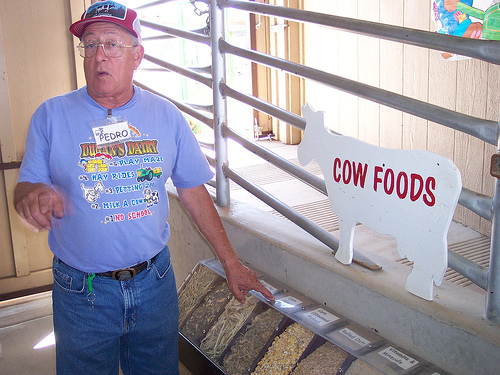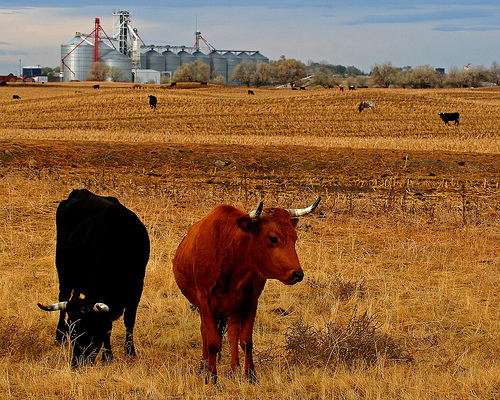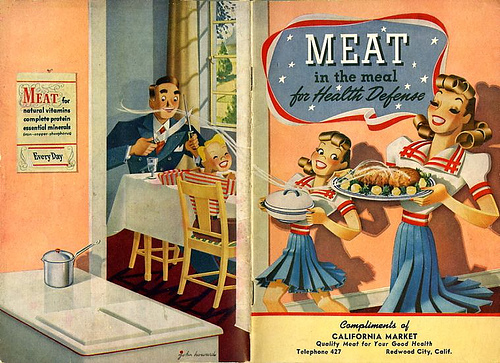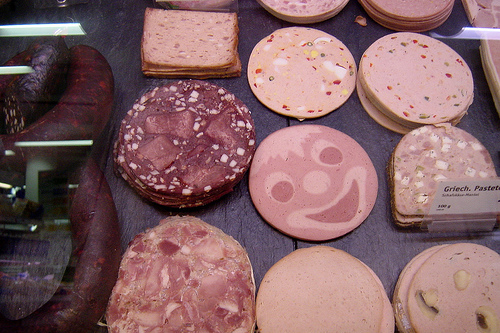A protein possibility for the post peak period: the meat beast
Posted by Big Gav in artificial meat
 Animal rights group PETA recently announced a $1 million reward for the first person to make in-vitro meat (leading Bruce Sterling to dub them "People for the Ethical Treatment of Alien Lumps of Flesh).
Animal rights group PETA recently announced a $1 million reward for the first person to make in-vitro meat (leading Bruce Sterling to dub them "People for the Ethical Treatment of Alien Lumps of Flesh).
While PETA's aim here seems to be to be to publicise their opposition to the consumption of animals (as shown in the quote below), there is another angle to this story which is perhaps more interesting for those interested in energy issues - which comes back to "the oil we eat".
"Why is PETA supporting this new technology? More than 40 billion chickens, fish, pigs, and cows are killed every year for food in the United States in horrific ways. Chickens are drugged to grow so large they often become crippled, mother pigs are confined to metal cages so small they can't move, and fish are hacked apart while still conscious — all to feed America's meat addiction. In vitro meat would spare animals from this suffering. In addition, in vitro meat would dramatically reduce the devastating effects the meat industry has on the environment.
"Of course, humans don't need to eat meat at all—vegetarians are less likely to get heart disease, diabetes, or various types of cancer or become obese than meat-eaters are—and a terrific array of vegetarian mock meats already exist. But as many people continue to refuse to kick their meat addictions, PETA is willing to help them gain access to flesh that doesn't cause suffering and death...."
The Oil We Eat
The link between oil and gas production and agriculture is one that should be well understood by now - and has been covered by a diverse range of writers including Dale Allen Pfeiffer (Eating Fossil Fuels), Richard Manning (The Oil We Eat), Stuart Staniford (Food To 2050), Sharyn Astyk (Is Relocalization Doomed ?) as well as my review of Herman Kahn's book "The Next 200 Years" (The Fat Man, The Population Bomb And The Green Revolution).
While I don't want to restart the debate about "reversalists", I think its worth looking at where a large amount of the grain we produce goes - meat production.
Feeding grain to livestock
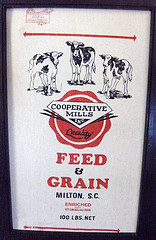 Corn, wheat and rice prices have all soared in recent years - this has been attributed to a number of factors, including:
Corn, wheat and rice prices have all soared in recent years - this has been attributed to a number of factors, including:- rising input prices for fertiliser, pesticides and diesel fuel
- the use of grain to produce biofuels
- adverse weather events like the Australian drought significantly reducing production
- commodity funds and other speculators on the markets
- "hoarding" and export restrictions being put in place (particularly for rice)
- productive land being built over by expanding cities
- increasing demand for grain courtesy of an increasing population
- increasingly affluent consumers in Asia increasing their meat consumption
While there is a lot of debate about which factors are the dominant ones in the price rises that have occurred so far, it seems clear that reducing demand would go some way to keeping prices down, and that finding alternative sources of protein would be one way of achieving this.
The Food and Agriculture Organisation of the UN publishes a World Food Outlook in May and November each year. The November 2007 edition shows that about a third of the grain produced (750Mt) is used as animal feed - compared to around 350 Mt that was used for biofuels (hat tip to Kiashu for providing the data).
| 2005/06 | 2006/07 | 2007/08 | Change: 2007/08 over | |
| estim. | f'cast | 2006/07 | ||
| million tonnes | % | |||
| WORLD BALANCE | ||||
| Production | 2 051.4 | 2 009.4 | 2 108.9 | 5.0 |
| Trade | 246.6 | 255.4 | 251.5 | -1.5 |
| Total utilization | 2 037.6 | 2 062.4 | 2 105.0 | 2.1 |
| Food | 982.5 | 997.5 | 1 008.7 | 1.1 |
| Feed | 748.7 | 735.9 | 739.6 | 0.5 |
| Other uses | 306.4 | 329.0 | 356.6 | 8.4 |
| Ending stocks | 471.4 | 428.0 | 427.0 | -0.2 |
| SUPPLY AND DEMAND INDICATORS | ||||
| Per caput food consumption: | ||||
| World (kg/year) | 152.2 | 152.7 | 152.6 | -0.1 |
| LIFDC (kg/year) | 156.9 | 157.2 | 157.0 | -0.1 |
| World stock-to-use ratio % | 22.9 | 20.3 | 20.2 | |
| Major exporters' stock-to-disappearance ratio % | 19.2 | 15.0 | 13.5 | |
Another 101 Mt of oilseeds (out of 404 Mt total) is turned into "oil meals and cakes", which is primarily eaten by livestock.
It is worth noting that not all of the animals fed end up on our dinner plates (or in hamburger wrappers) - dairy cattle are also included here and their milk production is another output from the use of these agricultural commodities.
Artifical Meat and science fiction
Artificial meat is a topic usually left to science fiction writers (see Kornbluth & Pohl, H Beam Piper, Samuel R Delany, Frank Herbert, Rudy Rucker or John Brunner for some examples), with a "meat beast" (or some other form of artificial protein produced in a vat) gracing the bowels of many spaceship kitchens and basements of remote arcologies, where raising livestock isn't an option.
Soylent Green is probably the example that comes most readily to mind, but this isn't really appropriate, as that meat wasn't artificially grown of course.
Where's the beef ? Is anyone seriously trying to make this stuff ?
Science fiction isn't usually meant to be predictive, so its surprising to see this sort of idea being (somewhat) seriously considered here on Earth in the present.
While PETA may or may not just be performing a publicity stunt, there does appear to be some research underway in this area, which is known as "In vitro meat".
There are basically two approaches for producing in vitro meat; loose muscle cells and structured muscle, with the creation of structured muscle being far more challenging than the former.
According to Wikipedia:
Muscles consist of muscle fibers, long cells with multiple nuclei. They don't proliferate by themselves, but arise when precursor cells fuse. Precursor cells can be embryonic stem cells or satellite cells, specialized stem cells in muscle tissue. Theoretically, they can be relatively simple to culture in a bioreactor and then later made to fuse. For the growth of real muscle however, the cells should grow "on the spot", which requires a perfusion system akin to a blood supply to deliver nutrients and oxygen close to the growing cells, as well as remove the waste products. In addition other cell types need to be grown like adipocytes, and chemical messengers should provide clues to the growing tissue about the structure. Lastly, muscle tissue needs to be trained to properly develop.
A number of teams are actively pursuing the cultivation of in vitro meat.
In 2001, dermatologist Wiete Westerhof from the University of Amsterdam and businessmen Willem van Eelen and Willem van Kooten announced that they had filed for a worldwide patent on a process to produce in vitro meat. A matrix of collagen is seeded with muscle cells, which are then bathed in a nutritious solution and induced to divide. They have now set up the InVitroMeat Foundation to promote the idea.
Jon Vein of the United States has secured a patent for the production of tissue engineered meat for human consumption, where muscle and fat cells would be grown in an integrated fashion to create food products such as beef, poultry and fish.
A group at the University of Maryland has participated in some experiments for NASA looking to grow meat during space flight, and is also looking to develop processes for terrestrial application. This group of researchers started the non-profit organization New Harvest, with the goal of promoting development of in-vitro meat. They claim cultured meat in a processed form, like sausage, hamburger, or chicken nuggets may become commercially available within several years.
In April 2005, a research project into cultured meat started in The Netherlands. It is carried out under the lead of Henk Haagsman at the University of Amsterdam, the Eindhoven University of Technology and Utrecht University, in cooperation with sausage manufacturer Stegeman. The Dutch government granted a two million euro subsidy for the project. In Amsterdam the culture medium is studied, while the University of Utrecht studies the proliferation of muscle cells and the Eindhoven university will research bioreactors.
A tissue engineer at the Medical University of South Carolina has proposed a countertop device similar to a bread maker that would produce meat overnight in your kitchen.
In recent weeks we have even had the world's first international conference on manufacturing meat.
Advocates for in vitro meat claim it is safer, healthier, more humane and less polluting to produce - as well as being one way of adapting to rising demand for food and constraints on the supply of inputs to traditional industrial agriculture. But one question remains, should a commercial meat production process ever be put into action - can we get past the "yuck" factor ?

